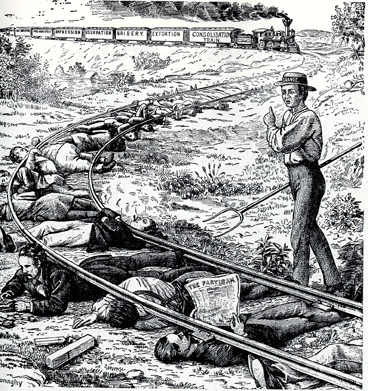Oh Jesus I don't Want to Read This
- by Bruce E. McKinney

Progress has a price.
By Bruce McKinney
When pundits discuss the economy the emphasis is always on growth measured on an inflation adjusted basis. So if growth, as measured as increase in GDP is 4.5% and inflation 2% net growth is 2.5%. Sustainable growth in the United States has been considered, in the post-World War II era, to be in the mid to high 2 percents. In the past ten years the Internet has changed economic expectations by introducing unpredicted efficiencies, in effect lowering costs for everything from used text books to new cars. It has increased effective GDP by another percent or so. It turns out that measurable change in economic activity isn't just the sum of increases in income [if you are a consumer] or sales [if you are a seller]. It's also increases in purchasing power. These days marketplace efficiency increases the value of disposable income by lowering the cost of many things we buy. Book buyers and sellers see this first hand as increasing market transparency that is both raising and lowering prices based on improving visibility of supply.
Participation is of course also changing. In the simplest economic model of book selling it is purely change in supply. In the real world there is also change in demand. In the more complex model of book selling book buying is an ever-decreasing variable among the ever-increasing choices human beings have. One hundred and fifty years ago the total of ALL news and information media was the sum of a few possibilities: newspapers, magazines, broadsides, pamphlets and books. Today we have many more including the ability to see and read material without having to possess the item.
This ability has lead to a division within the world of old and rare materials between the desire for original copies and a desire for access to their contents. Nowhere is this difference more stark than in libraries that are quickly embracing information, rather than physical copies, as their primary media. Every few months if not every few weeks more evidence arrives that books, and printed materials generally, are being replaced by electronic versions that are easier to use, more portable and environmentally friendly. This is why your local bookstore has closed and libraries are under pressure.
It is also turning out that the Internet and "new media" are bringing fundamental change to the way human beings think. We have known for a long time that we use only a small portion of our brains. Increasingly we are learning what this means. There are many ways to think, many ways to absorb information. Some people read, others scan, some hear music, others feel music. Some employ sequential logic, others "logical comparison." The Internet is providing a way for humans to move quickly, to create entire information maps with less effort than we could until recently clear a single path. Books are single stepping stones on the paths we devise. Our children, intellectual Tarzans and Janes, fly by on the ropes of complex relational thinking that makes our step by step approach seem as antiquated to them as their hopscotch approach looks frivolous to us.
At the outset I suggested that the value of money is, for many kinds of goods and books in particular, increasing as both the number of copies of books available becomes apparent and interest in these copies declines. This simply means that the value of many books is declining and that there are reasons for this. It's not a mystery or magic. It's just a fact.
For book sellers this suggests that more efficient lower cost selling tools are essential because if you can't raise your prices you had better lower your costs. And given that the market is increasingly online, the quality and complexity of descriptions, the use of keywords and increased sensitivity to timing will be very important.
The book business isn't going away but it is rapidly changing. The old ways will still work but increasingly they will work differently, rewarding the flexible.